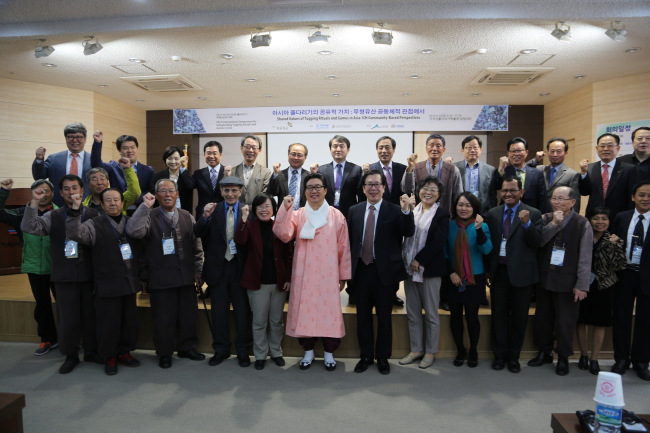Korea’s mass tug-of-war awaits UNESCO recognition
By Korea HeraldPublished : April 13, 2015 - 20:04
Experts from across Asia flocked to Korea’s Dangjin to discuss the international preservation of “juldarigi,” a traditional Asian folk game similar to tug-of-war.
The game is currently waiting to be designated an Intangible Cultural Heritage by the UNESCO, following an intergovernmental joint application submitted in 2013. Results will be announced this November at a conference in Namibia.
A symposium on the organized protection of juldarigi was held at the annual Dangjin Juldarigi Festival at Gijisi Juldarigi Museum on Friday, April 10. The event was hosted by ICHCAP and Chonbuk National University and sponsored by the Cultural Heritage Association and South Chungcheong Province.
The game is currently waiting to be designated an Intangible Cultural Heritage by the UNESCO, following an intergovernmental joint application submitted in 2013. Results will be announced this November at a conference in Namibia.
A symposium on the organized protection of juldarigi was held at the annual Dangjin Juldarigi Festival at Gijisi Juldarigi Museum on Friday, April 10. The event was hosted by ICHCAP and Chonbuk National University and sponsored by the Cultural Heritage Association and South Chungcheong Province.

At the event, experts from Korea and a handful of Southeast Asian countries including Thailand, Vietnam and the Philippines presented cases from each country. A roundtable was also held to discuss the establishment of an international network of exchange and cooperation regarding the preservation of the tradition.
“Representatives from each country shared views on the social, cultural and political significance of the international juldarigi community and its need for unity,” said Ryu Ha-jin, project consultant at the ICHCAP and organizer of the event.
“They also discussed future cooperative measures that would take place after the potential UNESCO registration.”
Juldarigi is a traditional folk game where two teams pull at either end of a thick rope that is made of rice straws and has a mark in the middle. Victory is awarded to the team that pulls the marked rope away from the opposing team and closer to themselves.
Beloved and widely played in Korea, the game is also prevalent in rice farming countries around the world, especially those in East and Southeast Asia. Historically, it was performed as a ritual to pray for rain and a good harvest. Unique variations can be seen in each region, differing according to the climate and culture.
In Korea, juldarigi of the Gijisi region was designated Important Intangible Cultural Property No. 75 in 1982.
To make the 40-ton, 200-meter-long rope used for the game, “over 40 thousand pieces of straw are placed onto a wooden frame and woven into a thick braid,” explained Gijisi Juldarigi Museum curator Ko Dae-young. “It takes about one month to make.”
The 500-year-old tradition reflects the cooperative spirit of Korea’s agricultural region, Ko said.
“It is a physical team effort in which everyone can participate. Both locals and tourists can come and join the game.”
Juldarigi has long had a special place in the hearts of local residents.
“It’s said that our ancestors here overcame the devastation of natural disasters and calamity by playing juldarigi,” Ko said. “That’s why locals today feel a sort of responsibility for protecting the game.”
Four countries ― Korea, Cambodia, the Philippines and Vietnam ― have jointly applied for the UNESCO recognition of their tradition.
The UNESCO Secretariat is currently evaluating the application. Results will be announced at the 10th annual session of the Intergovernmental Committee for the Safeguarding of Intangible Cultural Heritage, this year to be held in Namibia from Nov. 30-Dec. 4.
By Rumy Doo (bigbird@heraldcorp.com)
-
Articles by Korea Herald









![[Hello India] Hyundai Motor vows to boost 'clean mobility' in India](http://res.heraldm.com/phpwas/restmb_idxmake.php?idx=644&simg=/content/image/2024/04/25/20240425050672_0.jpg&u=)









